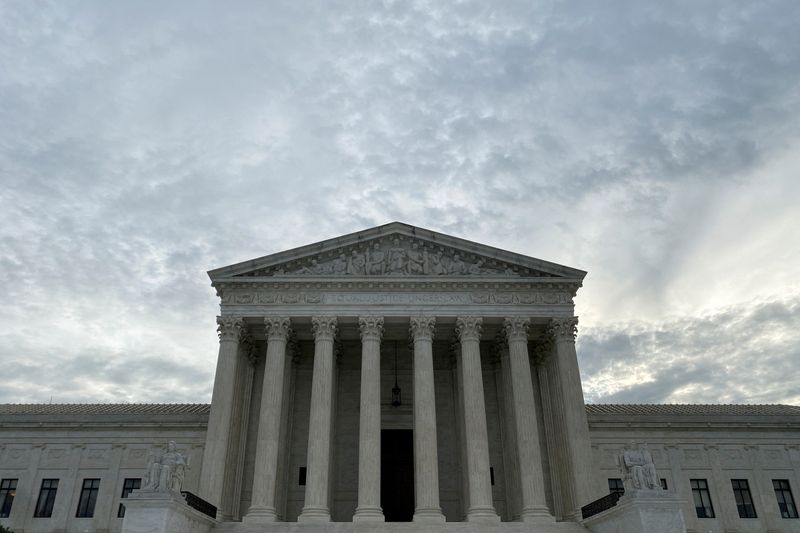By Lawrence Hurley and Andrew Chung
(Reuters) -The U.S. Supreme Court on Monday appeared receptive to making it easier for public school employees to more freely express their religious views, signaling it would side with a Christian former high school football coach in Washington state who refused to stop leading prayers with players on the field after games.
The court's conservative justices appeared prepared to allow such expression of religious views despite concerns that in a public school setting this could be seen as coercive to students or a governmental endorsement of a particular religion in violation of the U.S. Constitution's First Amendment.
The court, whose 6-3 conservative majority has taken a broad view of religious liberty in numerous cases, heard arguments involving Joseph Kennedy, a former part-time assistant football coach in the city of Bremerton. Kennedy appealed a lower court's ruling that rejected his claims that the local school district's decision to suspend him in 2015 for refusing to stop the prayers and Christian-infused speeches after games violated his First Amendment religious exercise and free speech rights.
Conservative Justice Samuel Alito suggested that the school district specifically targeted religious speech, wondering whether Kennedy would have been disciplined for waving a Ukrainian flag to protest Russia's invasion.
"What reason is there to believe that you would have treated that case the same way?" Alito asked Richard Katskee, a lawyer for the school board.
At issue is whether, as a public employee, Kennedy's actions amounted to governmental speech, which can be regulated under Supreme Court precedents, or a private act separate from his official duties, which the First Amendment would protect.
Conservative justices signaled skepticism toward the idea that Kennedy's actions could be viewed as governmental endorsement of religion, which was the basis upon which lower courts ruled. They noted that his prayers occurred after games and seemed to view them as not part of his official duties.
Justice Brett Kavanaugh said Kennedy did not order players to "huddle up" as he would during his normal coaching duties, meaning they were not required to join.
Justice Amy Coney Barrett, another conservative, said Kennedy's prayers could be seen as private activity, like a teacher running a Christian club after school. In such situations in which employees makes it clear they are speaking for themselves outside of their normal duties "nobody could mistake it for government speech," Barrett said.
'GOT ON A KNEE'
The school district notified Kennedy to stop the prayers while on duty, offering other private locations in the school as alternatives. He initially appeared to comply, it said, but later refused and made media appearances publicizing the dispute, attracting national attention. After repeated defiance, Kennedy was placed on paid leave from his seasonal contract and did not re-apply as a coach the subsequent season.
Liberal justices questioned why Kennedy drew attention to his prayer and later sought publicity over the controversy.
"He's the one who chose to publicize his prayer by doing it on the 50-yard line. He didn't do it on the side. He didn't just bow his head. He got on a knee at the very center of the field," liberal Justice Sonia Sotomayor said.
Justice Elena Kagan mentioned Supreme Court precedents that let schools discipline teachers for activity that "puts a kind of undue pressure, a kind of coercion on students to participate in religious activities when they may not wish to."
Even if it is clear a teacher is not speaking on behalf of the school district, coercion could be present, Kagan added.
Paul Clement, the lawyer representing Kennedy, said there is no evidence students were coerced, saying the school district had originally argued only that it was seeking to avoid endorsing a particular religion.
Kennedy served as a coach at his alma mater, Bremerton High School, from 2008 to 2015. His lawyers assert that he "lost his job" because of his actions, suing in 2016. Kennedy sought a court order to be reinstated as a coach, accusing officials of religious discrimination and violating his free speech rights.

Officials noted in court papers that Kennedy has moved to Florida. He has said he would return if he gets his job back.
A ruling is due by the end of June.